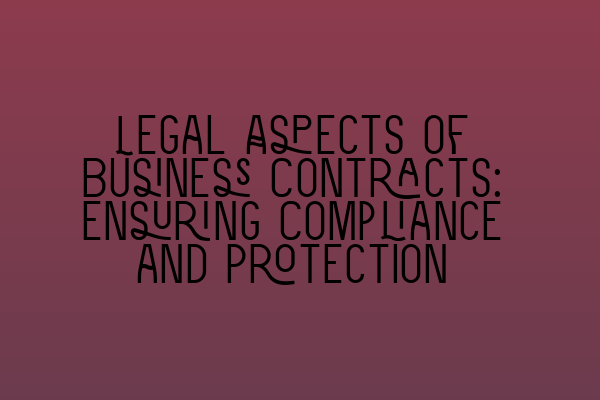Legal Aspects of Business Contracts: Ensuring Compliance and Protection
In the world of business, contracts form the backbone of commercial transactions. From employment agreements to vendor contracts, these legally binding documents play a crucial role in defining the rights, obligations, and expectations of all parties involved. As a business owner or professional, it is essential to understand the legal aspects of business contracts to ensure compliance and protection.
1. Understanding the Basics of Business Contracts
Before delving into the legal nuances, it is important to grasp the fundamentals of business contracts. A contract is a legally enforceable agreement between two or more parties, typically involving an exchange of goods, services, or promises. To be valid, a contract must contain certain elements, including offer, acceptance, consideration, mutual assent, and capacity.
2. Importance of Contractual Compliance
Compliance with contractual obligations is crucial for maintaining trust and avoiding legal disputes. By adhering to the terms and conditions outlined in the contract, you demonstrate your commitment to fulfilling your responsibilities. Failure to comply with contractual obligations can result in financial penalties, damage to your reputation, and even litigation.
3. Ensuring Contractual Protection
While compliance is essential, protecting your interests should also be a priority. When drafting or entering into a contract, it is important to consider how you can safeguard your rights and mitigate risks. This can be achieved through the inclusion of clauses such as indemnity clauses, limitation of liability clauses, and dispute resolution provisions.
4. Seeking Professional Legal Advice
Navigating the complexities of business contracts can be challenging, especially if you lack legal expertise. As an astute business owner or professional, it is wise to seek the guidance of a qualified solicitor who specializes in contract law. They can review your contracts, provide valuable advice, and ensure that all legal requirements are met.
5. Contractual Disputes and Resolution
Even with the best intentions, contractual disputes can arise. When disagreements occur, it is vital to have a clear framework for resolving these issues. Many contracts include dispute resolution clauses that outline the procedure for resolving conflicts, such as arbitration or mediation. Such provisions can help you save time, costs, and maintain business relationships.
6. Staying Up-to-Date with Legal Changes
The legal landscape is constantly evolving, and laws related to contracts can change over time. As a business professional, it is crucial to stay abreast of these changes to ensure that your contracts remain valid and enforceable. Engaging in continuing professional development and working with legal experts can help you stay updated on the latest legal developments.
In conclusion, business contracts are the foundation of commercial relationships, providing clarity, protection, and guidance to all parties involved. By understanding the legal aspects of contracts, ensuring compliance, and seeking professional advice when needed, you can protect your interests, avoid disputes, and build successful business partnerships.
For more information on the SQE exam and legal preparation courses, check out the following related articles:
– SQE 1 Practice Exam Questions
– SQE 1 Practice Mocks FLK1 FLK2
– SQE 2 Preparation Courses
– SQE 1 Preparation Courses
– SRA SQE Exam Dates
Remember, understanding the legal aspects of business contracts is crucial for ensuring compliance, protecting your interests, and building strong business relationships. So, make sure to dedicate the necessary time and resources to this important aspect of your professional endeavors.
